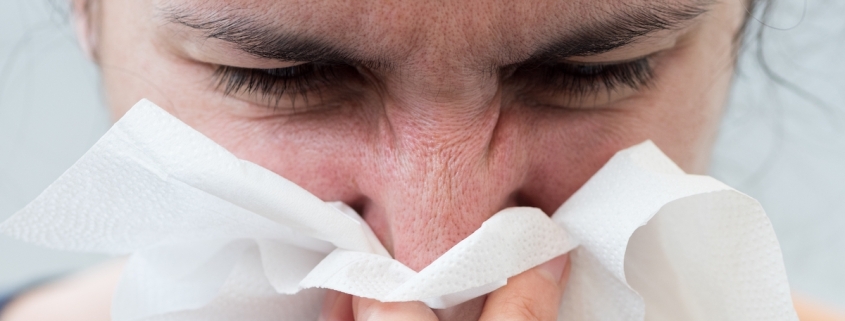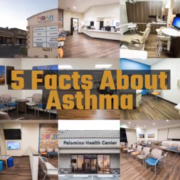Asthma? Allergies? Or Both?
Springtime in the Arizona desert can be surprisingly full of blooms and trees. While it is beautiful, it can also wreak havoc on patients who suffer from seasonal allergies. For those with asthma, it can be a double whammy with uncontrolled allergies triggering their breathing troubles. Nearly 70% of asthmatics report that allergens are a major cause of their asthma symptoms. Arizona’s allergy season usually occurs in spring and fall, but can start as early as January and last until November. Allergies are a result of your body’s immune system reacting to a foreign substance like pollen, dust, or animal dander. Living in the desert with its lack of rain also keeps the irritants suspended in the air, causing more allergy symptoms. It is important to identify your asthma triggers, including allergies, to minimize symptoms and keep your asthma under control.
Allergy Symptoms
Some symptoms of allergies can be confused with a common cold. If these symptoms last more than two weeks, consider seeing your doctor to be evaluated for allergies. Allergy symptoms may include:
- Runny nose or persistent nasal congestion
- Watery, itchy or red eyes
- Sneezing
- Scratchy throat
- Frequent sniffling
- Rash (hives)
Asthma Symptoms and Triggers
Some patients may experience more of these symptoms during spring or fall if allergies are triggering their asthma. Asthma symptoms may include:
- Shortness of breath
- Frequent coughing with exercise
- Chronic nighttime cough
- Wheezing
- Tightness in chest
There can be many triggers for asthma around you. These can be seasonal or present all year round. Identifying and controlling these triggers is essential to bringing your asthma under control. Asthma Triggers may include:
- Seasonal allergies (pollen, dust mites, roaches, mold, trees, grasses, animals, dust, etc.)
- Tobacco smoke (pipe, cigarette, cigar, vape, etc.)
- Environmental pollution
- Exercise
- Seasonal changes
- Viral illness (common cold)
It Runs in the Family
Allergies and asthma tend to run in families. Children are more likely to be diagnosed with one or both conditions if their parents or siblings have been diagnosed with them in the past. Some children may even outgrow their allergies or asthma as they get older.
Prevention
Here are a few things you can do to help when allergies cause worsening of your asthma symptoms.
- Avoid outdoor activities when pollen counts are high or many flowers/trees are in bloom.
- If you can’t avoid outdoor activities, make sure to shower and change clothes immediately afterwards. Keep these dirty clothes outside of your bedroom.
- Keep windows and doors closed to prevent allergens from coming inside.
- Change air filters in the home regularly.
- If you can, remove carpets from the home or vacuum frequently.
- Clean frequently to keep bathrooms free of mold.
- Keep pets outside of the bedroom.
- Keep stuffed animals off the bed/sleeping surface.
- Start allergy medications.
Treatment
Make sure allergies are well controlled so they do not trigger your asthma. This may mean using a daily oral allergy medication or daily allergy nose spray. Some of these medications are available over the counter, like cetirizine or loratadine. Please avoid regularly using drugs containing diphenhydramine (such as Benadryl) for allergies without speaking with your doctor first. It is also important to avoid anything that can trigger your allergies, especially exposure to secondhand smoke.
It is important to have your asthma well managed to reduce the frequency and severity of flares when you encounter a trigger. Your physician can help get your asthma under good control with the use of prescription inhalers. If you need the asthma quick-relief medication more than twice a week or two nights a month, then your asthma is NOT under good control.
Talk with your NOAH provider about additional treatment options to further control your allergies and asthma. They may also recommend seeing an allergist or pulmonologist (lung specialist) for further care.







